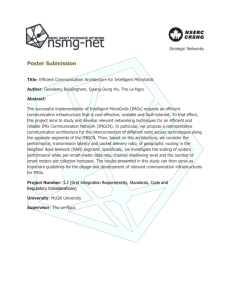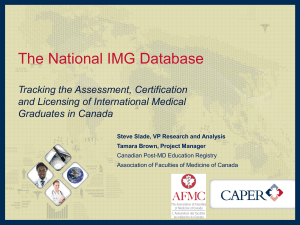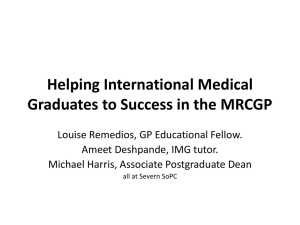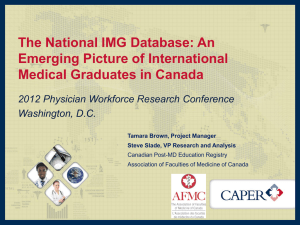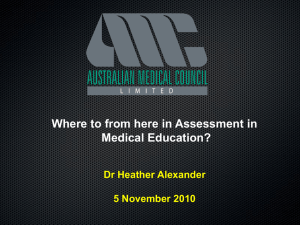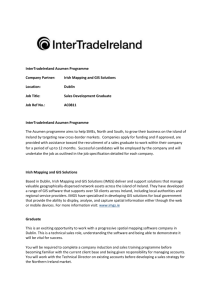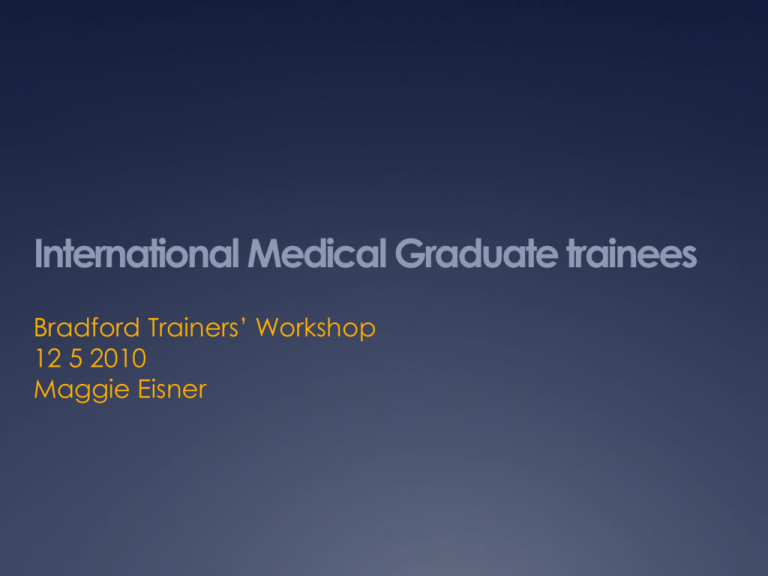
International Medical Graduate trainees
Bradford Trainers’ Workshop
12 5 2010
Maggie Eisner
Session plan
Sharing experiences of IMGs – Amanda Nix
IMGs and the CSA – Louise Riley
The IMGs’ point of view
How can trainers and the training scheme best
support IMGs?
Sheffield IMG survey
Sent to Sheffield IMGs in 2009
Headings under nMRCGP competencies
Also sent to educators
42 full responses
Report includes comments by many others to
whom initial responses were sent
Full report on Deanery website
Communication
The biggest issue by miles!
Underlies many of the other problem areas
Language and culture interlinked but useful to
consider separately
Communication - language
Colloquialisms
Pronunciation and accents – both the doctor’s
and the patients
Difficulty with humour
Learning stock phrases is of limited use may sound formulaic and insincere
doesn’t help doc adapt language to patient
Non verbal and para verbal (e g intonation) skills
also important
Communication - culture
IMGs (like all hospital doctors) may have
difficulty explaining their thoughts and plans to
patients
NB – not confined to IMGs – like many of the
difficulties, applies to any doctor and patient
communicating across language and cultural
barriers
Working with colleagues
Cultural differences important (medical and social
culture)
Most IMGs come from more hierarchical medical culture
– adapting to ours may be uncomfortable, with
disorientating sense of loss of role
Forms of address may cause discomfort (on both sides)
Cultural learning should be 2 way – it is as important for
team to understand IMG’s culture as vice versa.
We are all ambassadors for our culture – colleagues’
behaviour has great influence on how we perceive and
interact with others from the cultures they represent.
Holistic approach
Not true that IMGs don’t understand a holistic
approach – but theirs is in different social context
(extended family system)
Psych illness stigmatised in some cultures, may
make doctors reluctant to explore
Fee paying health service in home country may
make Dr reluctant to waste patient’s time
discussing psychosocial stuff
Biomedical -> holistic shift also experienced by
UK trained docs moving from hosp to GP
Clinical management
Different approaches determined by patient
expectations the doctor is used to, or range of
management options available
Incidence of different conditions in different
countries, implications of same sympts and signs
(e g fever in tropics and in UK)
Cultural communication factors may create
clinical management problems if sensitive issues
need to be discussed (esp male Dr and female
pt)
Medical complexity
Hard for all trainees (? and trainers) to grasp at
first
IMGs may find it especially hard because of
lack of experience earlier in career of
managing elderly patients with many co morbidities
NHS type primary care system
Idea of health promotion as integral to GP’s work
Professionalism
Values vary between cultures, including ethical
values underlying professional codes like ‘Duties
of a doctor’
Apparently ‘unprofessional’ behaviour can
reflect lack of familiarity with current UK
professional codes and the values underlying
them
Teaching methods
Student-teacher relationship differs between
cultures. Most IMGs used to expectation that
teachers should be respected unconditionally
and not challenged
Concept of self directed learning AND skills
needed for it may be unfamiliar
NB – all learners have individual learning styles;
educational culture IMGs have come from is
only one factor you need to know to design an
appropriate teaching programme
IMGs on Bradford STS
Currently 12 (11 Indian subcontinent, 1 EU)
3 meetings in 2010, ½ day at HDR and 2 full days at
Broughton Hall
Found out about their point of view – all felt that
communication is most important issue
Discussed areas of concern
Discussion and role play about difficult
communication areas – sex and death
Watched London Deanery video
Helping IMGs - principles
Start early
Be aware of challenges faced by IMGs
Respect them – don’t see them as a problem
IMGs in difficulty may need multifaceted support
(trainer, ES, TPD)
Helping IMGs – encourage to
Recognise and practise pt centred consultation skills (ICE, looking for
cues, sharing options) early
Be curious about patients’ lives, ask about them in consultation
Self assess on competencies early, and understand what they mean
Observe experienced colleagues’ consultations
Get involved in informal aspects of practice life
Watch TV soaps with local accent (Emmerdale), read newspapers
Get involved with English social groups
Try to speak English at home
Helping IMGs – trainers – at
the beginning
Get to know them as a person as early as poss, show
interest in their background, ? Invite them home
Team social activity early in their attachment
Go out/sit in with different team members
Early tutorial on practice patients’ help seeking
behaviour, perceptions of GP, role of GP in NHS
Assess their English (speaking, listening, reading, writing);
plan to address language needs
Explore their learning style and educational background
in order to plan your approach to their training
Helping IMGs – trainers
Tutorials about cultural/linguistic aspects of
Care of the elderly
Death, bereavement, care of the dying
Sexuality, sexual behaviour, sexual health
Tutorials on ethics and professionalism, sharing
dilemmas and areas which might be dealt with
differently in different cultures
Lots of video and role play
Lots of feedback (more than UK graduates)
To give confidence and encouragement
To identify learning needs

